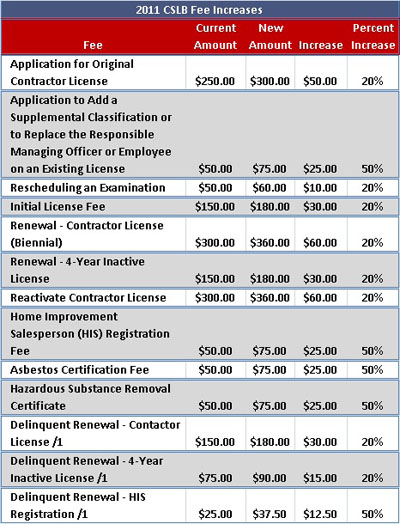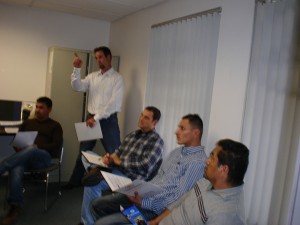We knew that this was coming and now it’s official. CSLB is scheduled to increase licensing fees begining July 1, 2011. If you’re thinking about getting your license or making changes to your license now is the time to do it.
Changes to existing regulations that would increase contractor licensing fees received final approval from the Office of Administrative Law, effective December 18, 2010. Fee increases begin on July 1, 2011 for those applying for or changing their contractor license. Renewal fees for contractor licenses that expire on or after July 1, 2011, will also be increased. CSLB fees have remained at their current level since 1993, and the additional revenue will assure CSLB upholds its mandated protection of California consumers and the integrity of the construction industry.
Category Archives: Uncategorized
CSLB Press Release on Ridgecrest Undercover Sting
 CSLB Identifies Phony Contractors in Ridgecrest Undercover Sting
CSLB Identifies Phony Contractors in Ridgecrest Undercover Sting
Undercover operation nets eight for contracting without a license and related violations
SACRAMENTO – The Contractors State License Board (CSLB) wants consumers in smaller communities and rural areas of the state to know that they’re especially vulnerable to becoming victimized by unlicensed contractors. Last week CSLB’s Statewide Investigative Fraud Team (SWIFT) investigators teamed with the Kern County Sheriffs and District Attorney Offices, and the Department of Homeland Security’s Immigration and Customs Enforcement to conduct a sting in the city of Ridgecrest.
The operation, conducted on February 3, 2011, led to the arrest of eight suspected unlicensed operators. CSLB investigators posed as homeowners and invited suspected phony contractors to a newly constructed home near Pearson Park. Investigators asked for bids that included landscaping, fencing, and painting. If the bid totaled more than $500 in labor and materials and the suspect was not state-licensed, they were arrested. Eight were given a Notice to Appear (NTA) in court to face misdemeanor charges of contracting without a license; some also face charges of illegal advertising, and soliciting an excessive down payment, also misdemeanors. All eight will face a charge of failing to secure workers’ compensation insurance for employees. They are scheduled to appear in Kern County Superior Court in Ridgecrest on March 29, 2011.
“This sting is a perfect example of why homeowners need to make sure the contractor they hire is properly licensed and insured. It only takes a minute to check information on the CSLB website at www.cslb.ca.gov or www.CheckTheLicenseFirst.com,” said CSLB Registrar Steve Sands. “If someone working on your property is injured and is not covered by workers’ compensation insurance, they could turn around and sue you for their medical bills.”
By law, anyone performing home improvement services that total more than $500 in material and labor must be licensed by the state of California. Contractors must include their CSLB license number in all advertisements and contracts. Those who are not licensed can only perform jobs valued at $500 or less. Their ad must state that they are not licensed.
CSLB received critical support for this operation from one of its legitimate licensed contractors. Four of the eight arrested during last week’s sting operation were the result of leads from that licensee.
Licensees face the difficult task of competing against those who break the law by operating in the multi-billion dollar underground economy. In addition, the loss of tax revenue takes money away from schools and law enforcement.
“Homeowners should also know that they have little recourse against an unlicensed operator if something goes wrong with a project,” added Sands. “That’s especially true if you give them a big down payment and they never show up to start the job.” CSLB offers a variety of free services, including mediation and arbitration, for consumers who have a problem with their licensed contractor.
CSLB urges all California consumers to follow these tips before hiring a home improvement contractor:
- Be especially hesitant when approached by someone offering home improvement services door-to-door.
- Verify the contractor’s license online at www.cslb.ca.gov or www.CheckTheLicenseFirst.com, or via CSLB’s automated phone system at 1-800-321-CSLB (2752).
- Ask to see a photo identification to verify the contractor’s identity.
- Don’t pay more than 10% down or $1,000, whichever is less. There is an exception to this rule for about two dozen contractors who purchase special bonds and are noted on CSLB’s website.
- Don’t pay in cash, and don’t let the payments get ahead of the work.
- Get at least three bids and insist on a written contract before your project begins.
Thousands of Jobs! TOSGA Presents Seminars on How You Can Connect with Private & Goverment Jobs!
 Ever wondered how to obtain the coveted Governement Contracts for your Contractors business or simply know how to gain more jobs? Look no more! Contractors State License Services is hosting another set of FREE seminars presented by TOSGA Global Alliance strategic Partner of CSLS. TOSGA offers services that assist small and minority businesses in connecting with Private and Government Sector jobs specifically for Contractors. There are thousands of construction jobs available in a variety of trades such as roofing, electrical, plumbing, painting, HVAC, concrete/paving and more!
Ever wondered how to obtain the coveted Governement Contracts for your Contractors business or simply know how to gain more jobs? Look no more! Contractors State License Services is hosting another set of FREE seminars presented by TOSGA Global Alliance strategic Partner of CSLS. TOSGA offers services that assist small and minority businesses in connecting with Private and Government Sector jobs specifically for Contractors. There are thousands of construction jobs available in a variety of trades such as roofing, electrical, plumbing, painting, HVAC, concrete/paving and more!
Learn how you as licensed contractor can connect and bid on these profitable construction jobs. Presentations are filling quickly. Contact a location near you to reserve a seat!
LOCATION DATE TIME CALL
South District
San Diego Feb 3, 5:30pm-6:30pm 619-283-2011
San Marcos Feb 2, 5:30pm-6:30pm 760-744-4334
Riverside Feb 2, 6:00pm-7:00pm 951-781-6161
Central District
Van Nuys Feb 3 6:00pm-7:00pm 818-901-6330
Northern District
Concord Feb 2, 6:00pm-7:00pm 925-686-8393
Modesto Feb 3, 6:00pm-7:00pm 209-526-8091
Sacramento Feb 17, 5:30pm-6:00pm 916-363-2784
San Jose Feb 15, 5:30pm-6:00pm 408-247-1242
Or visit the CSLS website for more details and directions http://www.contractorslicensingschools.com/contractor-education-events.cfm
CSLB Press Release 1/13/2011 : Monterey Residents Face Criminal Charges for Fraudulently Using Contractor License Numbers
 Suspects using business names “Window Design” and “Fresh Paint” arraigned on 146 counts
Suspects using business names “Window Design” and “Fresh Paint” arraigned on 146 counts
SACRAMENTO —Daniel Kenneth Furness, 58, and Colleen Gsell, 55, pleaded not guilty in Monterey County Superior Court on January 10, 2011, to 146 criminal charges relating to fraudulent use of other contractors’ license numbers, and adverting and contracting without their own license. The charges were filed following an investigation by the Contractors State License Board’s (CSLB) Central Valley Statewide Investigative Fraud Team (SWIFT), Monterey County District Attorney’s Office, and the Monterey and Marina Police Departments.
Furness and Gsell are suspected of using contractor license numbers not held by them, instead of obtaining their own licenses from the Contractors State License Board. For example, they allegedly used license numbers belonging to other people whose business names are “Window Design” and “Fresh Paint.” Furness and Gsell have not been issued a contractor license in either of their individual names, or a license to do business in the name of a company.
“We encourage homeowners to check their contractor’s license number on the CSLB website before any work is done,” said CSLB Registrar Steve Sands. “Consumers should ask to see the state-issued pocket license and a photo identification to make sure the person they are dealing with is the person who holds the contractor license in the appropriate work classification.”
Furness and Gsell are also suspected of illegal advertising and taking excessive down payments. Contractors must display their license number when advertising for jobs valued at more than $500 for labor and materials. It is also illegal to take down payments greater than 10 percent or $1,000, whichever is less, for any home improvement project. There is an exception for about two dozen contractors who purchase special consumer protection bonds and are noted on CSLB’s website.
Even though a consumer is not legally responsible for payments to an unlicensed contractor for projects valued at $500 or more for labor and materials, Furness is charged with instituting litigation against a deceased client’s estate and making inaccurate statements in a claim of lien filed against this client’s property. A licensed contractor or material supplier is entitled to file a mechanic’s lien if the contract amount is not paid as stated in the signed contract. An unlicensed operator who has contracted for work valued at more than $500 for labor and materials has no legal standing to do so. Furness is also charged with committing perjury in an application filed with CSLB.
Furness is formally charged with three counts of perjury and three counts of filing a false document. Furness and Gsell are each charged with 54 counts of illegal use of a contractor license number not issued to them; 42 counts of contracting without a contractor license; 23 counts of illegal advertising; and 21 counts of charging an excessive down payment.
“Those contracting without a license should understand that CSLB and its partners in law enforcement will not tolerate behavior that is detrimental to homeowners and licensed contractors who are complying with state laws and regulations,” added Sands.
CSLB Zero-Tolerance Policy for C-10 Employee Certification Requirements Creating Buzz
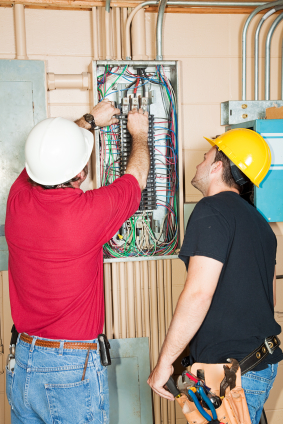 This is an important notice for C-10 Electrical Contractors working in the state of California. Make sure you are following electrician certification requirements and avoid fines from the CSLB.
This is an important notice for C-10 Electrical Contractors working in the state of California. Make sure you are following electrician certification requirements and avoid fines from the CSLB.
At a recent meeting of the CSLB Enforcement Committee (January 12, 2011) held at the Board’s new Valencia Investigative Center, Board enforcement staff reported over 30,000 licensees have received notice of the Board’s Zero-Tolerance Policy for C-10 Electrical Contractors employing uncertified electricians.
Labor Compliance Officers and members of electrical worker unions have been aggressively reporting C-10 contractors who violate the electrician certification requirements established by the Labor Code Section 3099 and regulated by the Department of Industrial Relations Division of Apprenticeship Standards (DIR/DAS). The Labor Code requires CSLB to investigate every report of a violation. Board enforcement staff indicated investigations resulted in 10 citations in the last month alone.
Electricians are defined as all persons who engage in the connection of electrical devices for C-10 contractors. It is CSLB’s position that electrical work must be performed by a certified electrician or an approved apprentice. Trenching, concrete, framing, and other work that does not involve connecting electrical devices may be performed by noncertified workers. For more information about the Board’s Zero-Tolerance Policy for C-10 Employee Certification Requirements, visit the CSLB Industry Bulletin from 11/19/2010 for more information.
10 FOR 11 – CSLS Top Ten books for 2011
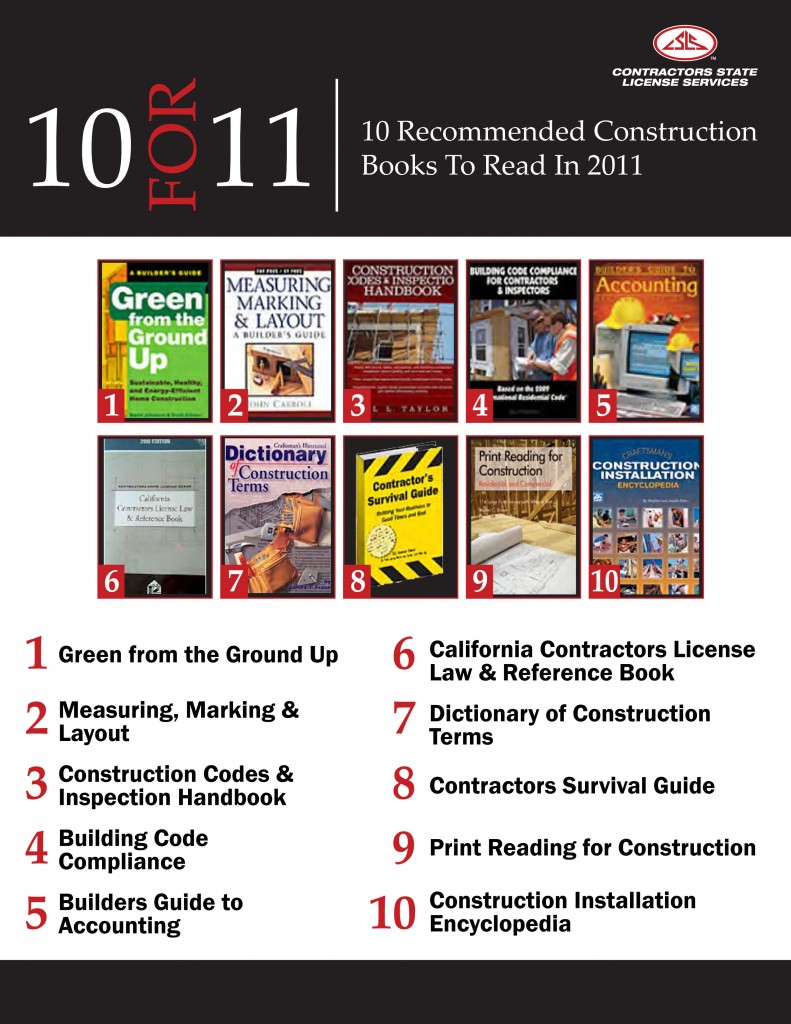 Our top 10 selection for 2011 reflects those books that are most popular through our in-school and online contractors bookstores. These books include important information for any contractor whether you’ve just gotten your contractor’s license or have been running your construction business for years. The cover general construction concepts such as estimating, print reading and how to run a successful construction business. In addition to these great books we have a wide selection of books that are specific to a variety of trade classifications including General B, C-36 Plumbing, C-39 Roofing, C-46 Solar, C-5 Carpentry and many more. If you need construction reference books for your trade or are studying for your Trade License exam and need a little help, take a visit to the CSLS Online Bookstore or visit a school location near you.
Our top 10 selection for 2011 reflects those books that are most popular through our in-school and online contractors bookstores. These books include important information for any contractor whether you’ve just gotten your contractor’s license or have been running your construction business for years. The cover general construction concepts such as estimating, print reading and how to run a successful construction business. In addition to these great books we have a wide selection of books that are specific to a variety of trade classifications including General B, C-36 Plumbing, C-39 Roofing, C-46 Solar, C-5 Carpentry and many more. If you need construction reference books for your trade or are studying for your Trade License exam and need a little help, take a visit to the CSLS Online Bookstore or visit a school location near you.
CARLSBAD: Kelly Elementary hero construction workers get scholarships
Five men working at Kelly during shooting to get $1,000 for classes
By STACY BRANDT – sbrandt@nctimes.com | Posted: Saturday, January 8, 2011 6:00 am
The construction workers who tackled a gunman at Kelly Elementary School in October will be able to further their own education soon with some help from a statewide contractors training program.
Contractors State License Services, a private vocational school, has offered the men —- Mario Contreras, Steven Kane, Carlos Partida, Toby Wiest and Edward Dominguez —- free tuition and materials for one of its courses, up to $1,000.
Most of the men said they want to study to get a state contractors license and the scholarship would cover the cost of that course, or another course offered by the school.
The men, who work for San Diego-based Randall Construction, said the offer was appreciated, especially because they haven’t had steady work since the job at Kelly Elementary ended in October. Becoming licensed contractors will help them get more work or branch out on their own, they said.
The class to prepare them for taking the contractors test can take anywhere from six weeks to four months to finish, depending on how quickly they do the work.
In the end, the school will help them get their license, set up a business name and help process paperwork, said Alex Avelar, state license consultant for the Van Nuys-based school.
The five men were pouring concrete at the school the day 41-year-old Brendan O’Rourke allegedly opened fire on children in the playground. Contreras and Kane chased after the gunman on foot while Partida clipped him with his truck.
Kane returned to work the same day with Dominguez and Wiest, while Partida and Contreras took a few days off. Partida said he wanted to collect his thoughts before returning to work, and Contreras was nursing his hand, which he broke during the scuffle.
The school offered the scholarships to reward the workers for their heroism, said Cyndi Beaver, marketing coordinator at the school.
“It was an opportunity for us to kind of give back,” she said.
O’Rourke allegedly shot two second-grade girls in the arm before the men chased him out of the playground. Both children recovered and returned to school quickly, school officials said.
Kane said he was overwhelmed initially by all of the attention the men got after the incident, but now it feels as if it happened long ago. More importantly, he said, he’s thankful that nobody was more seriously hurt.
Call staff writer Stacy Brandt at 760-901-4009 begin_of_the_skype_highlighting 760-901-4009 end_of_the_skype_highlighting.
San Diego Tribune Reports on CSLS Scholarship for local heroes
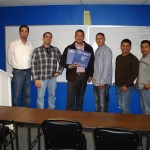 Free tuition offered to Kelly school heroes
Free tuition offered to Kelly school heroes
By Aaron Burgin
Thursday, January 6, 2011 at 6:13 p.m.
SAN MARCOS — The Kelly Elementary School construction-worker heroes are going back to school, and the school is picking up the tab.
Carlos Partida, Eddie Dominguez, Steven Kane, Mario Contreras and Toby Wiest helped subdue Brendan Liam O’Rourke, who is accused of opening fire at Kelly Elementary School in Carlsbad in October, wounding two second-grade girls. The workers chased after him after he stopped to reload. Partida knocked him to the ground with a truck and helped hold him until police arrived.
Contreras suffered a broken hand when he punched O’Rourke.
Van Nuys-based Contractors State License Services, a private vocational school in San Marcos, is giving $1,000 scholarships to each man. The scholarships will pay for the workers to take one course, such as for contractor’s license examination preparation, blue print reading or contract estimating.
The school stepped in to offer the scholarships after learning about the heroics displayed by the workers, which garnered national attention. Days before the shooting, the school offered Victor Perez, a Fresno construction worker who rescued an 8-year-old girl who had been kidnapped, a similar scholarship.
“We were kind of on a hero thing,” Cyndi Beaver, the school’s marketing coordinator, said Thursday during a ceremony. “We just wanted to acknowledge our heroes in the construction industry.”
The timing of the scholarships couldn’t have been better, the men said. They are all currently unemployed. For most of them, the contract at Kelly Elementary, a renovation of the school’s kitchen, was their last job.
“We’re looking,” Partida said. “There’s just not much out there right now.”
Four of the five men said they would use the scholarship to get their Class B state contractor’s license, which would enable them to find more work or potentially start a business themselves.
The men say they have been overwhelmed by the adulation they have received.
“We still get the ‘you’re a hero’ response,” Kane said. “It’s been really nice.”
Important CSLB Bulletin: Contractors State License Board Encourages Vigilance as Winter Storms Hit State
SACRAMENTO — In the wake of heavy rain, mudslides, flooding and their aftermath, the Contractors State License Board (CSLB) reminds California property owners to stay vigilant when it comes to contracting for clean-up or repairs. Sometimes what appears to be the cheapest solution to remove a fallen tree, fix a downed fence, or patch a leaky roof may not be the wisest choice.
Consumers can use CSLB™s online resources to check the license status of the contractor they plan to hire, and to get tips on home repair and improvement choices. Any construction job valued at $500 or more in labor and materials must be done by a state-licensed contractor. California Business & Professions Code requires all licensees to carry workers compensation insurance coverage for their employees and to purchase a contractor license bond.
Now that Governor Schwarzenegger has declared a State of Emergency in several coastal, Central Valley, and Southern California counties, anyone caught contracting without a California contractor license can potentially be charged with a felony and subject to up to $10,000 in fines and three years in state prison (Business and Professions Code section 7028.16). In areas that are not state or federally-declared disaster areas, penalties are generally misdemeanors.
“A state-licensed contractor is the right choice when looking for a legitimate, qualified home repairperson”especially in an urgent situation,” said CSLB Registrar Steve Sands. “A CSLB-licensed contractor who is skilled in the specific trade you are seeking is not likely to leave you in the lurch when it comes to properly completing the job at a fair price.”
For tree trimming and removal jobs where the tree is 15 feet or higher and the job is more than $500, the contractor must be state-licensed. Business & Professions Code allows a gardener to do incidental pruning on trees less than 15 feet and under a cost of $500 without a CSLB license.
CSLB urges consumers to follow these tips when soliciting bids from a home improvement contractor:
• Hire only licensed contractors, and ask to see the license and photo identification to make sure the person is who they claim to be.
• Dont rush into repairs, no matter how badly they are needed.
Understanding the Contractor’s License Bond

In California, anyone who contracts to perform work that is valued at $500 or more for labor and materials must hold a current, valid license from the Contractors State License Board (hereinafter “CSLB”) and must carry a Contractor’s License Bond. Surety bonds are commonly used for this purpose, but cash or certificates of deposit may also be posted. All Contractor License Bonds must be implemented by an authorized surety company, in a manner up to the required standard of the CSLB and suitable to the State of California. Currently the CSLB requires that contractor’s bonds be in the sum of twelve thousand five hundred dollars ($12,500). At their discretion, the Board may require an applicant to carry a higher bond amount or separate bonds for contractors who have been disciplined, and the amounts of these bonds vary. The bond amount is not per job. It is the amount available for all jobs a contractor takes on during the life of the bond.
A surety bond is a contract in which a surety company promises the State of California that the contractor will comply with the Contractors’ State License Law. Generally speaking, a licensed contractor is obligated not to commit any violations of the Contractors’ State License Law. The law describes and identifies specific violations that the bond will cover and violations can result in disciplinary action against the licensed contractor. California Business and Professions Code § 7071.15 provides that failure to maintain a sufficient bond can result in a minimum penalty of suspension ranging from 60 days up to 1 year probation, and a maximum penalty of revocation. Additionally, if warranted the CSLB can impose an actual suspension of the license for 5 days or more, require contractors to retake the CSLB law and business examination if not taken within the past 5 years, impose educational course requirements, or require payment of CSLB investigation and enforcements costs.
If the contractor does not comply with the conditions of the bond, a consumer, supplier or an employee can file a claim against the bond. California Business and Professions Code § 7071.5 provides that the contractor’s bond shall be for the benefit of the following:
(a) A homeowner contracting for home improvement upon the homeowner’s personal family residence damaged as a result of a violation of this chapter by the licensee.
(b) A property owner contracting for the construction of a single-family dwelling who is damaged as a result of a violation of this chapter by the licensee. That property owner shall only recover under this subdivision if the single-family dwelling is not intended for sale or offered for sale at the time the damages were incurred.
(c) A person damaged as a result of a willful and deliberate violation of this chapter by the licensee, or by the fraud of the licensee in the execution or performance of a construction contract.
(d) An employee of the licensee damaged by the licensee’s failure to pay wages.
(e) A person or entity, including an express trust fund described in Section 3111 of the Civil Code, to whom a portion of the compensation of an employee of a licensee is paid by agreement with that employee or the collective bargaining agent of that employee, damaged as the result of the licensee’s failure to pay fringe benefits for its employees, including, but not limited to, employer payments described in Section 1773.1 of the Labor Code and regulations thereunder (without regard to whether the work was performed on a private or public work). Damage to an express trust fund is limited to actual employer payments required to be made on behalf of employees of the licensee, as part of the overall compensation of those employees, which the licensee fails to pay.
General requirements for bonds include the following:
•Bonds are NOT transferable – do not attempt to transfer a bond from
one license to another or from one qualifying individual to another;
•The business name and license number on the bond must correspond EXACTLY to the information in the records of the CSLB
•The license number on the bond of a qualifying individual must match that of the firm for whom the individual is to serve as the qualifying individual;
•Contractors bonds must be in the correct amount of $12,500;
•A bond of a qualifying individual must be in the correct amount of $12,500;
•The bond must have the signature of the attorney-in-fact ; and
•Bonds must be filed with the CSLB within 90 days of the effective date of the bond.
To avoid problems with the bonds filed for your license and to maintain your bonds, the following guidelines are helpful:
•Keep your required bonds, cash deposits, or bond exemptions current at all times;
•Renew your bonds promptly. Make sure that the effective date of a new bond is the same as the cancellation date of the old bond and allow for processing time;
•Only one bond is effective at any time. A second bond filed for the same period will cancel out the first bond;
•CSLB does not return any bond that has been accepted or processed for an active license; and
•Keep accurate records on your agent, surety company, bond numbers, effective dates, and terms of the bonds.
If a contractor receives notice from their surety company that a claim has been filed against his/her bond, the contractor should immediately contact the surety company to respond to the claim and explain his/her position. The contractor should also submit all documentation relevant to the claim. If a complaint is filed with the CSLB, the contractor should also respond immediately and provide the CSLB all of the requested information and documentation throughout the course of the investigation. Complaints filed with the CSLB and with surety companies are taken very seriously and a contractor’s cooperation is critical to a successful resolution.
——————————————————————————
1. See California Business and Professions Code § 7071.6.
2. The term attorney-in-fact is commonly used in the United States, to make a distinction from the term Attorney at law. An attorney-at-law in the United States is a lawyer—someone licensed to practice law in a particular jurisdiction. As an agent, an attorney-in-fact is a fiduciary for the principal, so the law requires an attorney-in-fact to be completely honest with and loyal to the principal in their dealings with each other. See Wikipedia @ http://en.wikipedia.org/wiki/Power_of_attorney .
